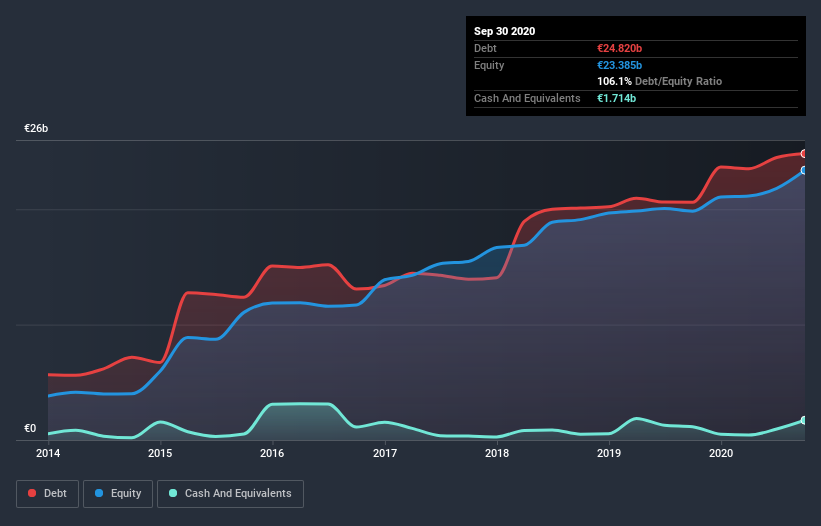
Warren Buffett famously said, 'Volatility is far from synonymous with risk.' When we think about how risky a company is, we always like to look at its use of debt, since debt overload can lead to ruin. Importantly, Vonovia SE (ETR:VNA) does carry debt. But the real question is whether this debt is making the company risky.
When Is Debt Dangerous?
Debt and other liabilities become risky for a business when it cannot easily fulfill those obligations, either with free cash flow or by raising capital at an attractive price. Ultimately, if the company can't fulfill its legal obligations to repay debt, shareholders could walk away with nothing. While that is not too common, we often do see indebted companies permanently diluting shareholders because lenders force them to raise capital at a distressed price. Of course, debt can be an important tool in businesses, particularly capital heavy businesses. When we examine debt levels, we first consider both cash and debt levels, together.
Check out our latest analysis for Vonovia
What Is Vonovia's Debt?
The image below, which you can click on for greater detail, shows that at September 2020 Vonovia had debt of €24.8b, up from €20.6b in one year. However, because it has a cash reserve of €1.71b, its net debt is less, at about €23.1b.

How Healthy Is Vonovia's Balance Sheet?
According to the last reported balance sheet, Vonovia had liabilities of €2.71b due within 12 months, and liabilities of €34.5b due beyond 12 months. Offsetting this, it had €1.71b in cash and €326.4m in receivables that were due within 12 months. So it has liabilities totalling €35.2b more than its cash and near-term receivables, combined.
When you consider that this deficiency exceeds the company's huge €31.0b market capitalization, you might well be inclined to review the balance sheet intently. Hypothetically, extremely heavy dilution would be required if the company were forced to pay down its liabilities by raising capital at the current share price.
In order to size up a company's debt relative to its earnings, we calculate its net debt divided by its earnings before interest, tax, depreciation, and amortization (EBITDA) and its earnings before interest and tax (EBIT) divided by its interest expense (its interest cover). This way, we consider both the absolute quantum of the debt, as well as the interest rates paid on it.
As it happens Vonovia has a fairly concerning net debt to EBITDA ratio of 14.2 but very strong interest coverage of 10.0. This means that unless the company has access to very cheap debt, that interest expense will likely grow in the future. We also note that Vonovia improved its EBIT from a last year's loss to a positive €3.7b. There's no doubt that we learn most about debt from the balance sheet. But it is future earnings, more than anything, that will determine Vonovia's ability to maintain a healthy balance sheet going forward. So if you're focused on the future you can check out this free report showing analyst profit forecasts.
Finally, a company can only pay off debt with cold hard cash, not accounting profits. So it's worth checking how much of the earnings before interest and tax (EBIT) is backed by free cash flow. Looking at the most recent year, Vonovia recorded free cash flow of 39% of its EBIT, which is weaker than we'd expect. That weak cash conversion makes it more difficult to handle indebtedness.
Our View
We'd go so far as to say Vonovia's net debt to EBITDA was disappointing. But on the bright side, its interest cover is a good sign, and makes us more optimistic. Looking at the bigger picture, it seems clear to us that Vonovia's use of debt is creating risks for the company. If all goes well, that should boost returns, but on the flip side, the risk of permanent capital loss is elevated by the debt. There's no doubt that we learn most about debt from the balance sheet. But ultimately, every company can contain risks that exist outside of the balance sheet. Take risks, for example - Vonovia has 5 warning signs (and 2 which are concerning) we think you should know about.
Of course, if you're the type of investor who prefers buying stocks without the burden of debt, then don't hesitate to discover our exclusive list of net cash growth stocks, today.
If you decide to trade Vonovia, use the lowest-cost* platform that is rated #1 Overall by Barron’s, Interactive Brokers. Trade stocks, options, futures, forex, bonds and funds on 135 markets, all from a single integrated account. Promoted
New: Manage All Your Stock Portfolios in One Place
We've created the ultimate portfolio companion for stock investors, and it's free.
• Connect an unlimited number of Portfolios and see your total in one currency
• Be alerted to new Warning Signs or Risks via email or mobile
• Track the Fair Value of your stocks
This article by Simply Wall St is general in nature. It does not constitute a recommendation to buy or sell any stock, and does not take account of your objectives, or your financial situation. We aim to bring you long-term focused analysis driven by fundamental data. Note that our analysis may not factor in the latest price-sensitive company announcements or qualitative material. Simply Wall St has no position in any stocks mentioned.
*Interactive Brokers Rated Lowest Cost Broker by StockBrokers.com Annual Online Review 2020
Have feedback on this article? Concerned about the content? Get in touch with us directly. Alternatively, email editorial-team@simplywallst.com.
About XTRA:VNA
Vonovia
Operates as an integrated residential real estate company in Europe.
Moderate growth potential second-rate dividend payer.
Similar Companies
Market Insights
Community Narratives




